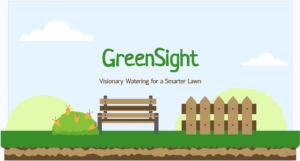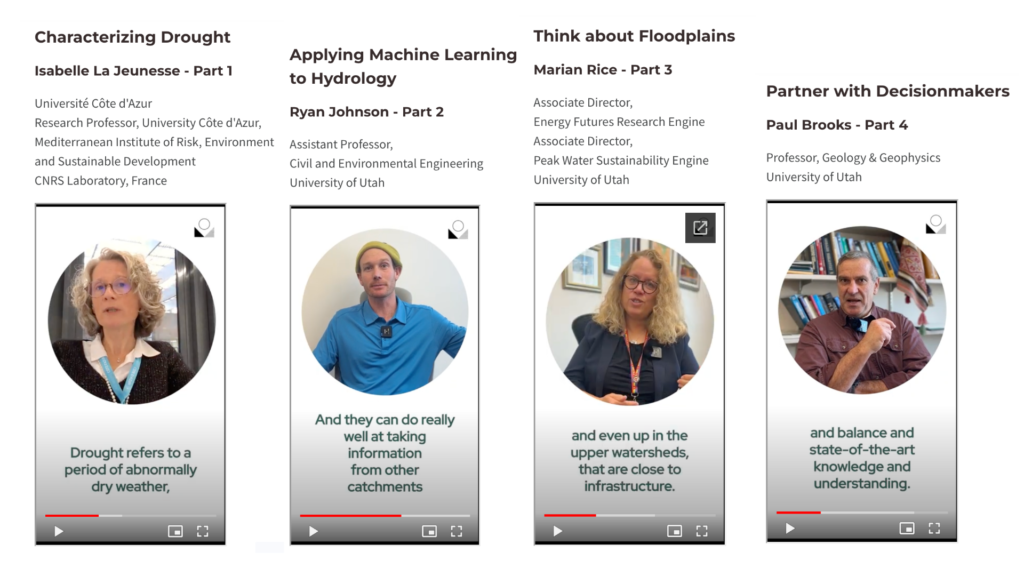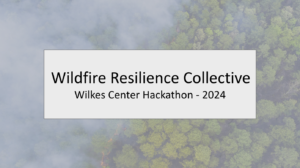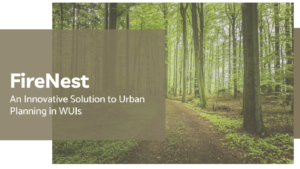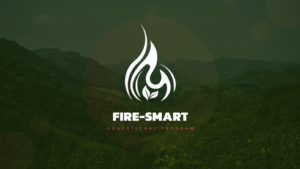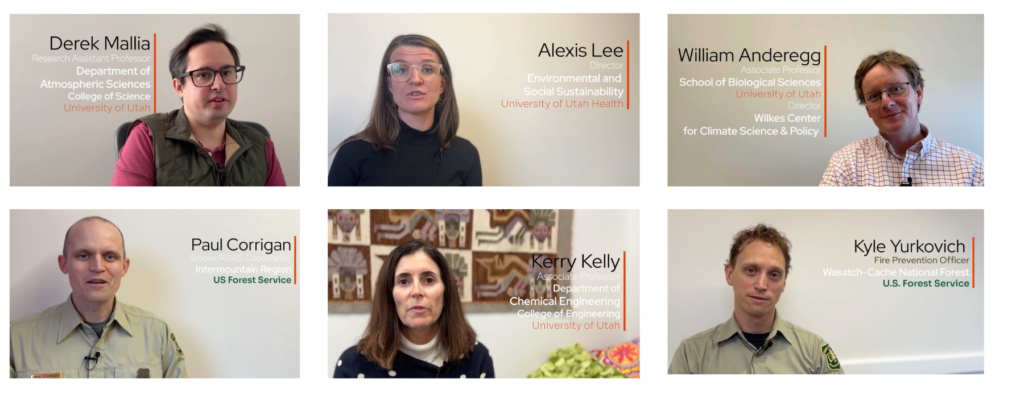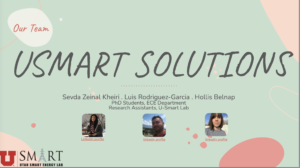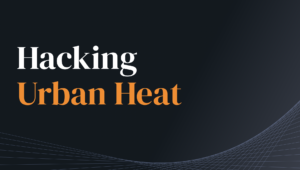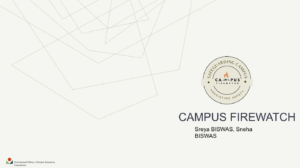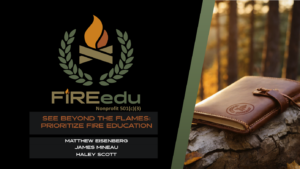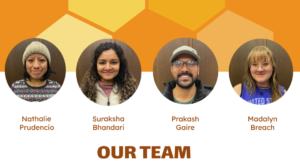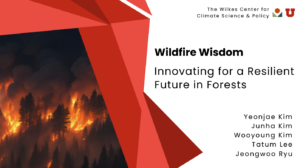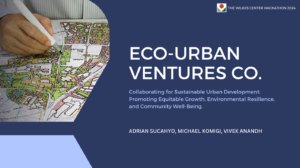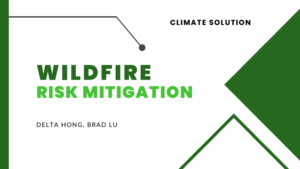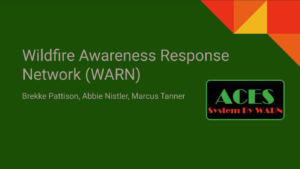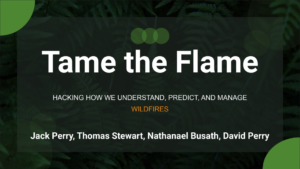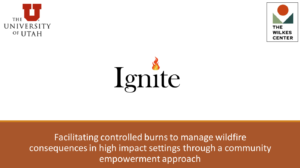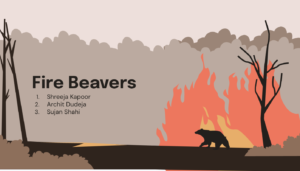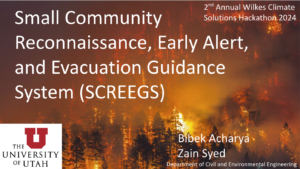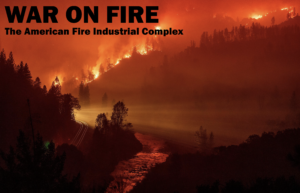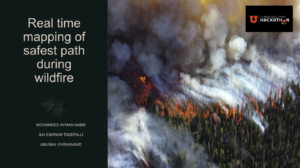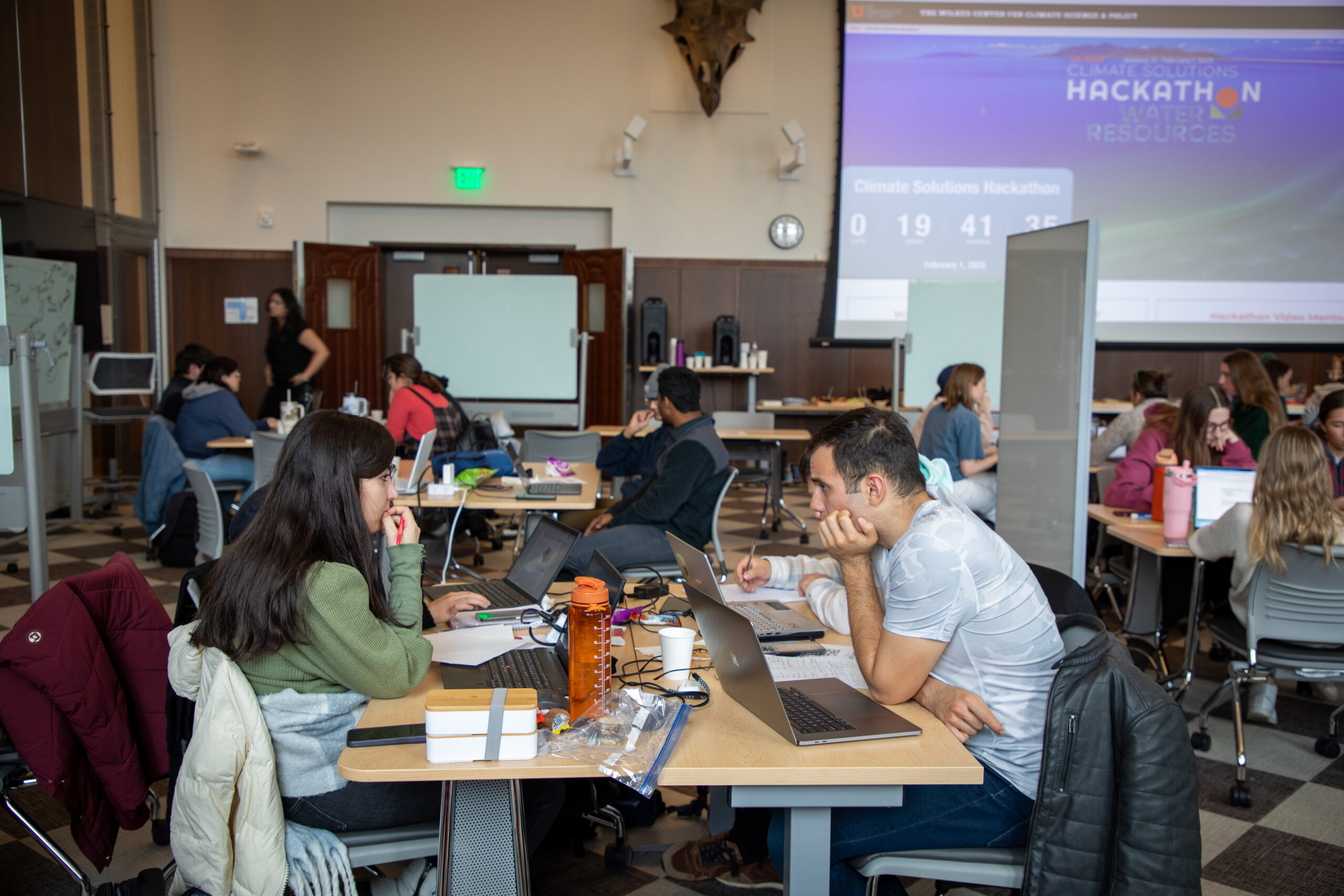
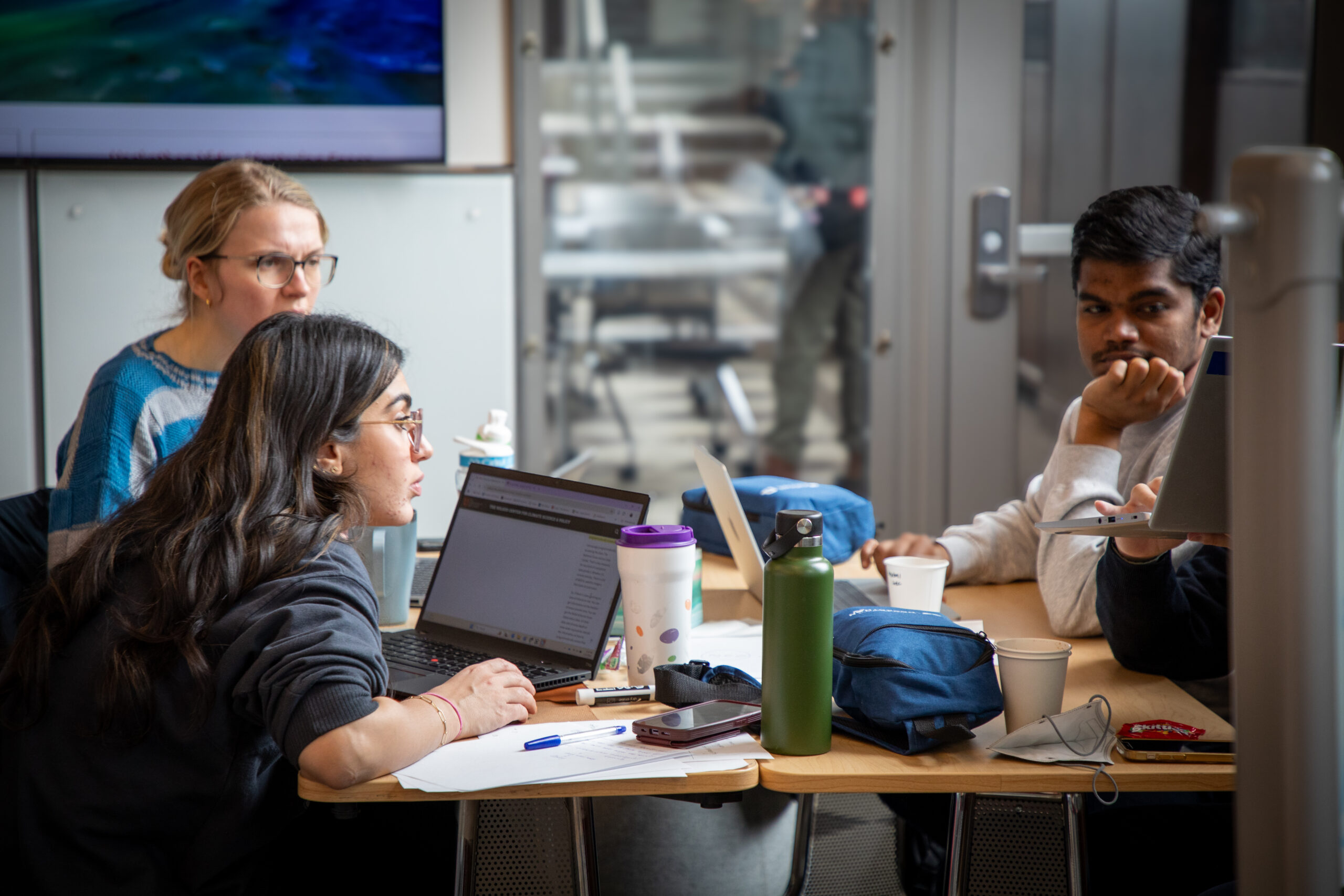
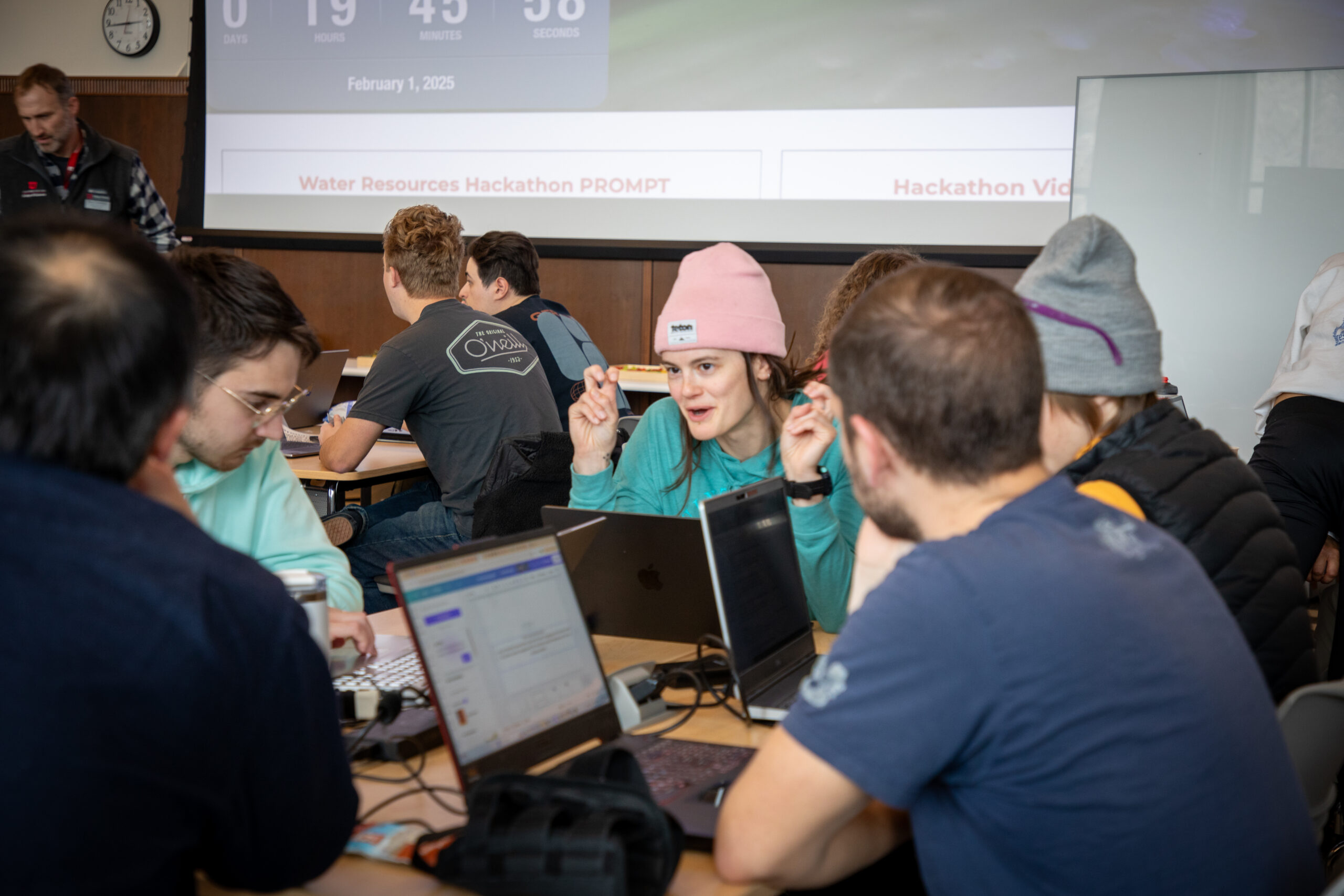
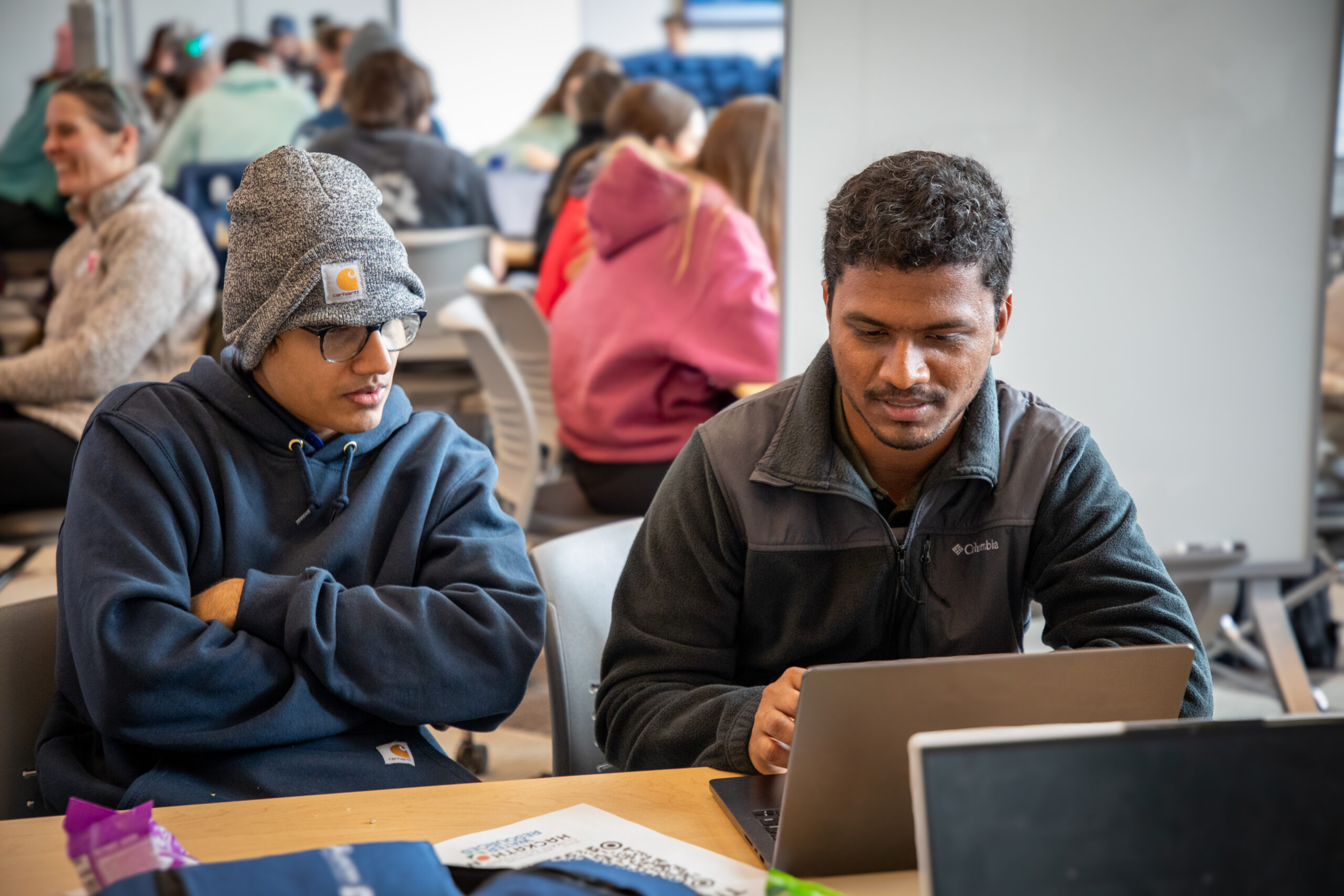
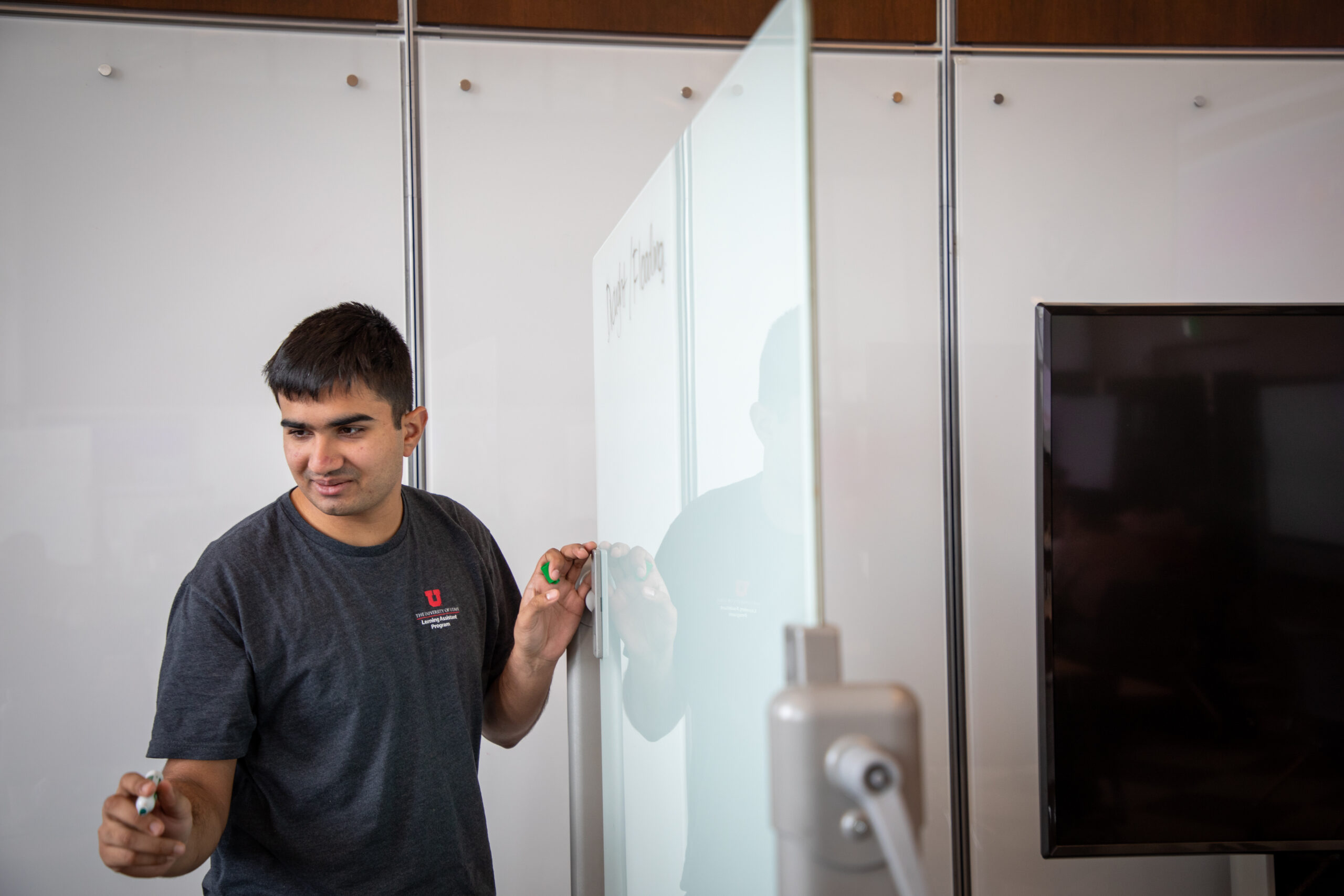
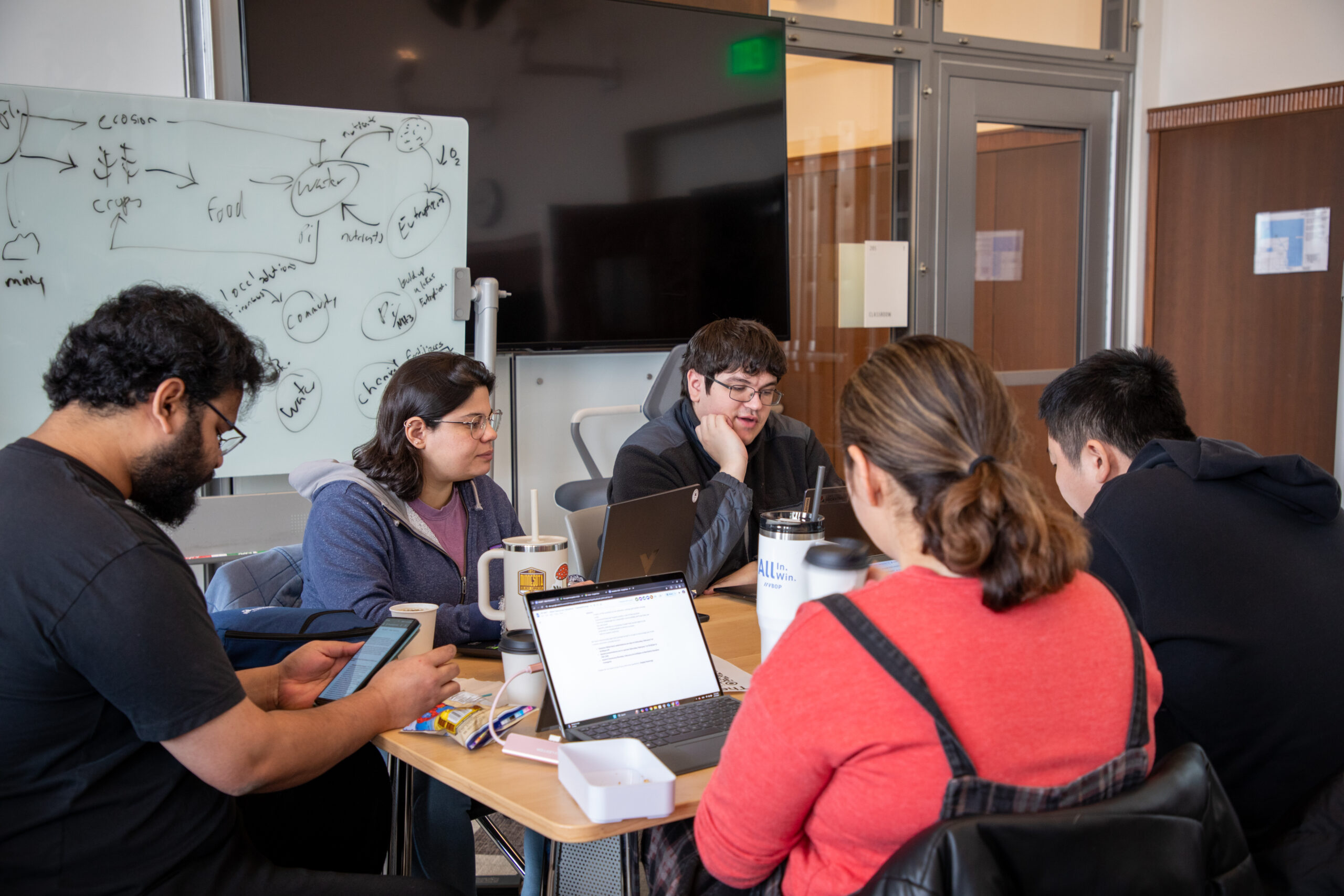
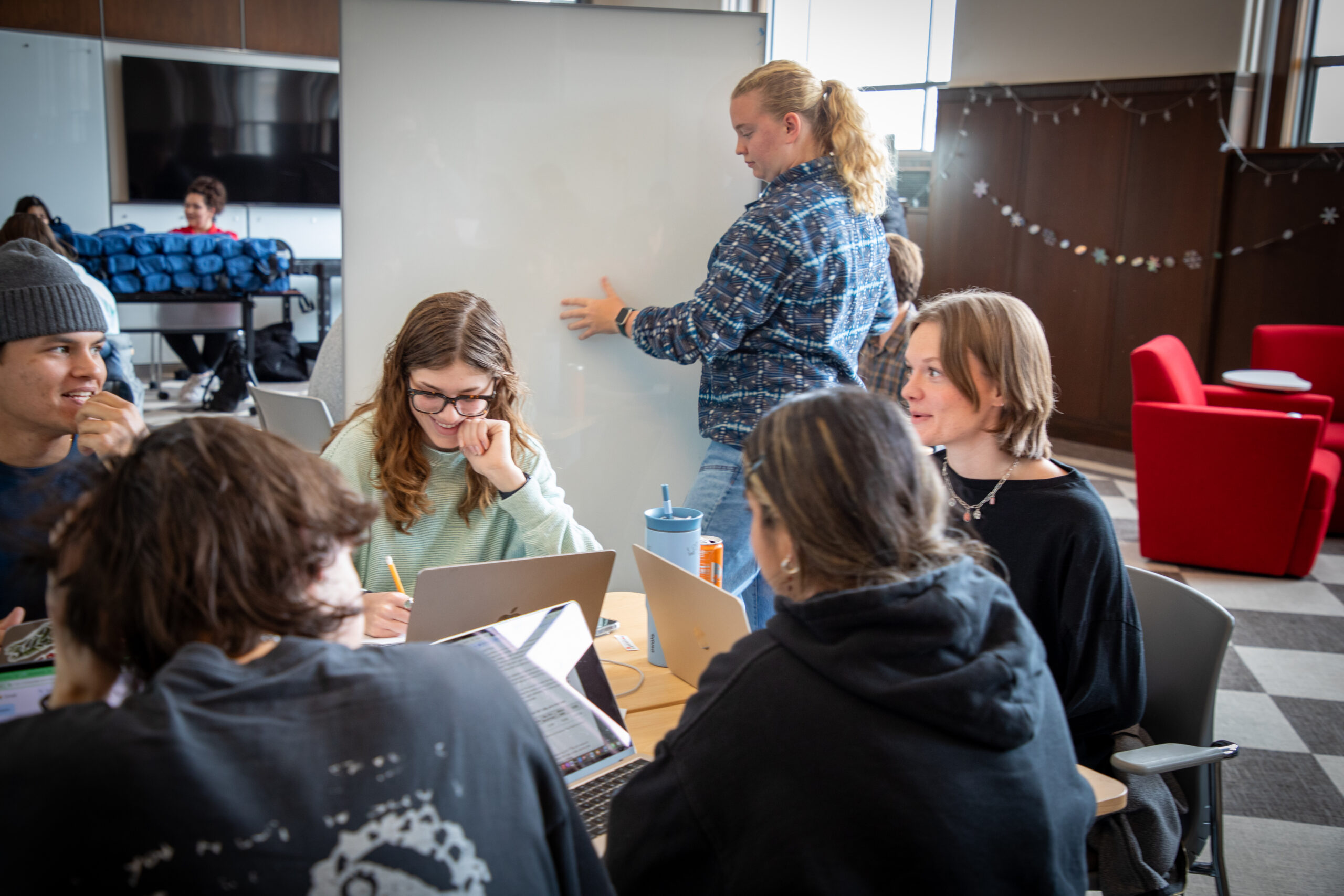
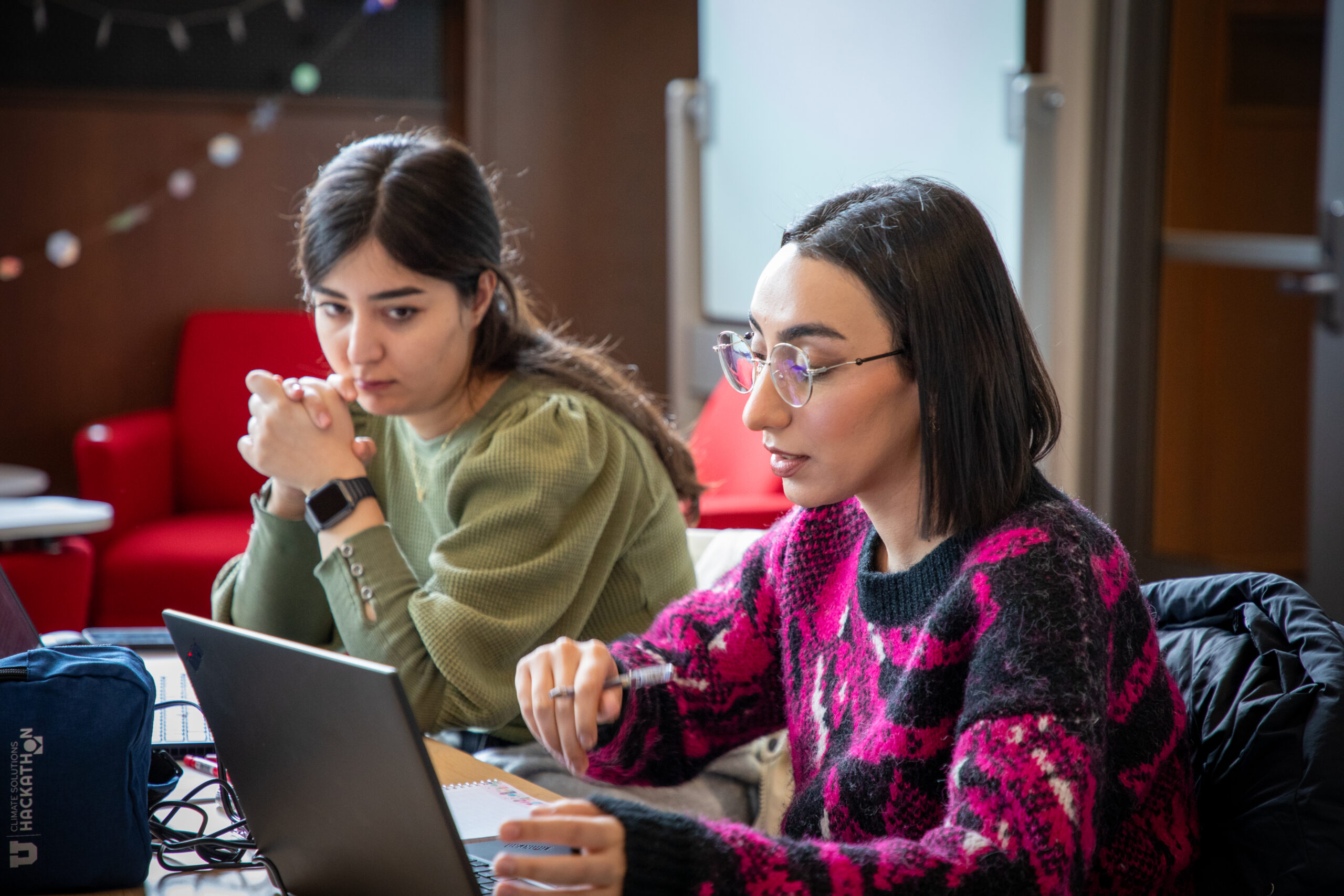
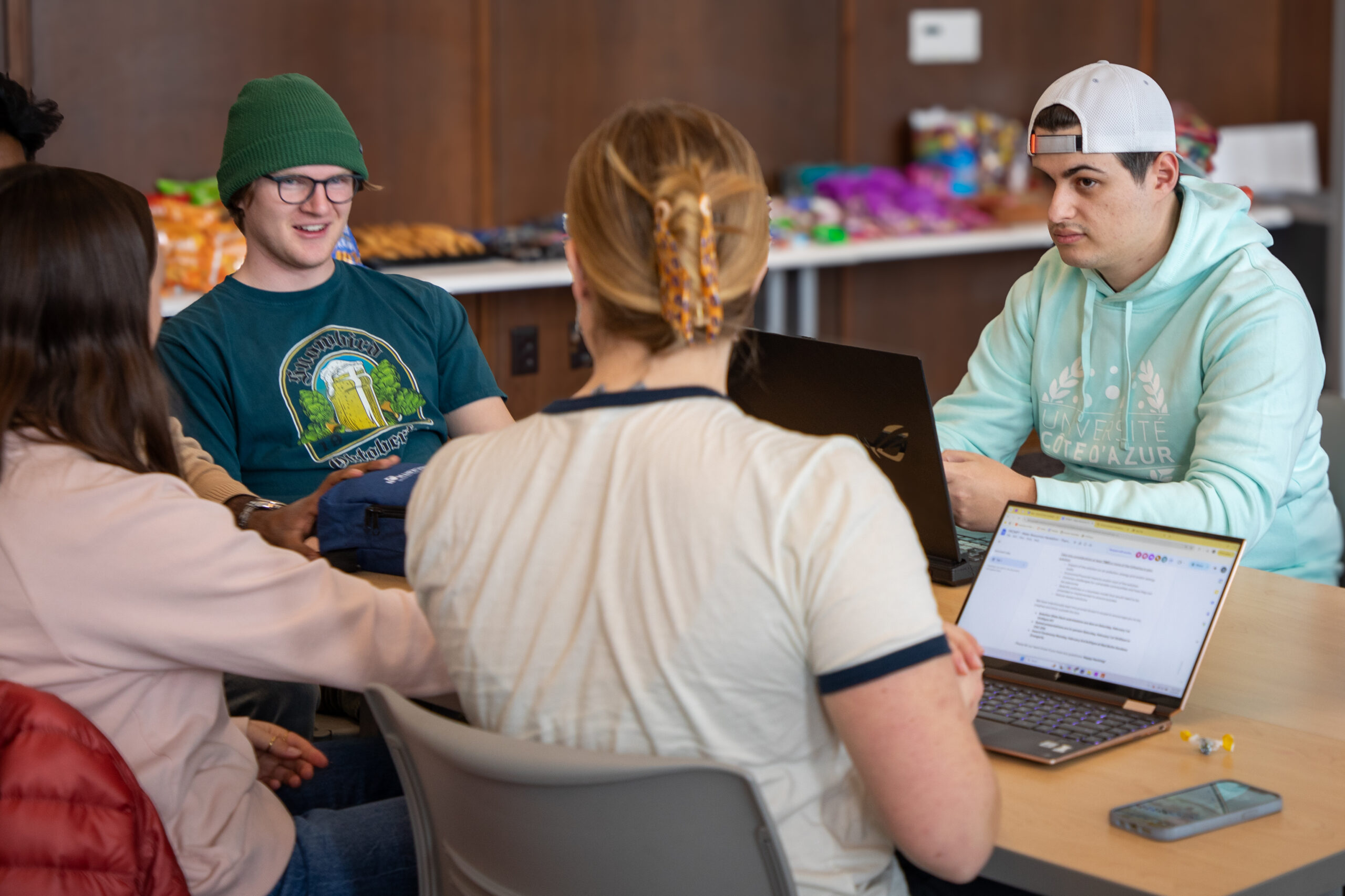
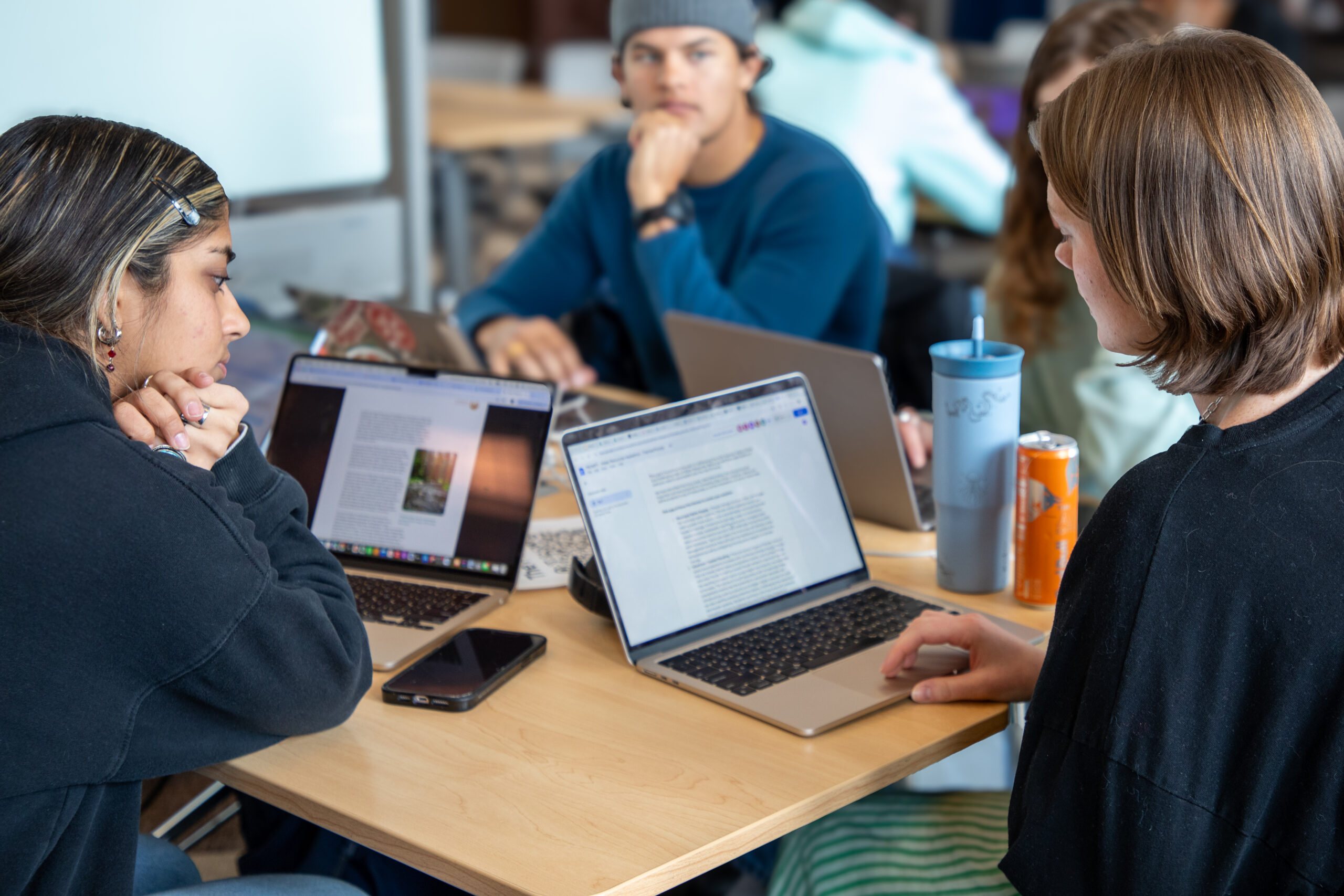
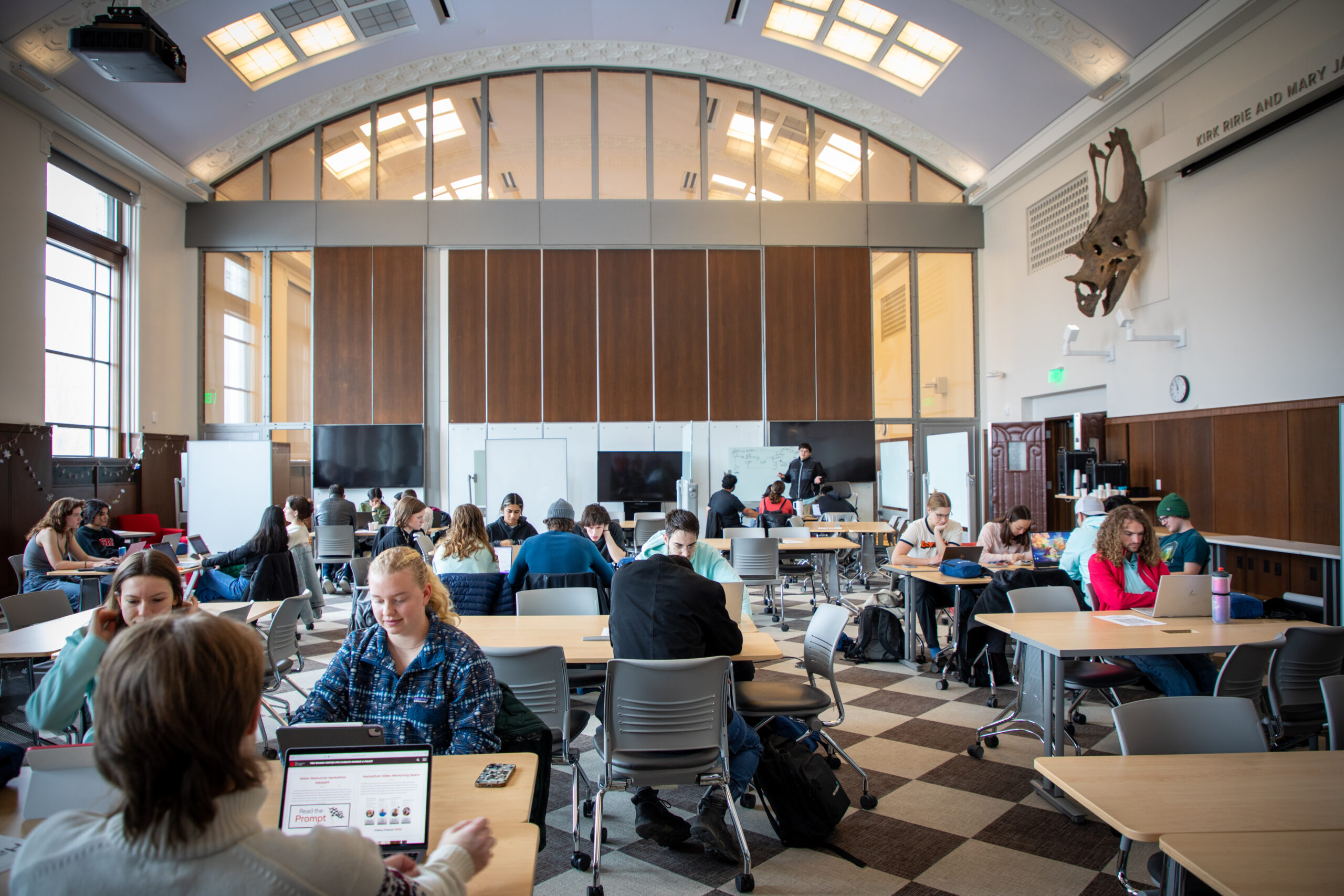
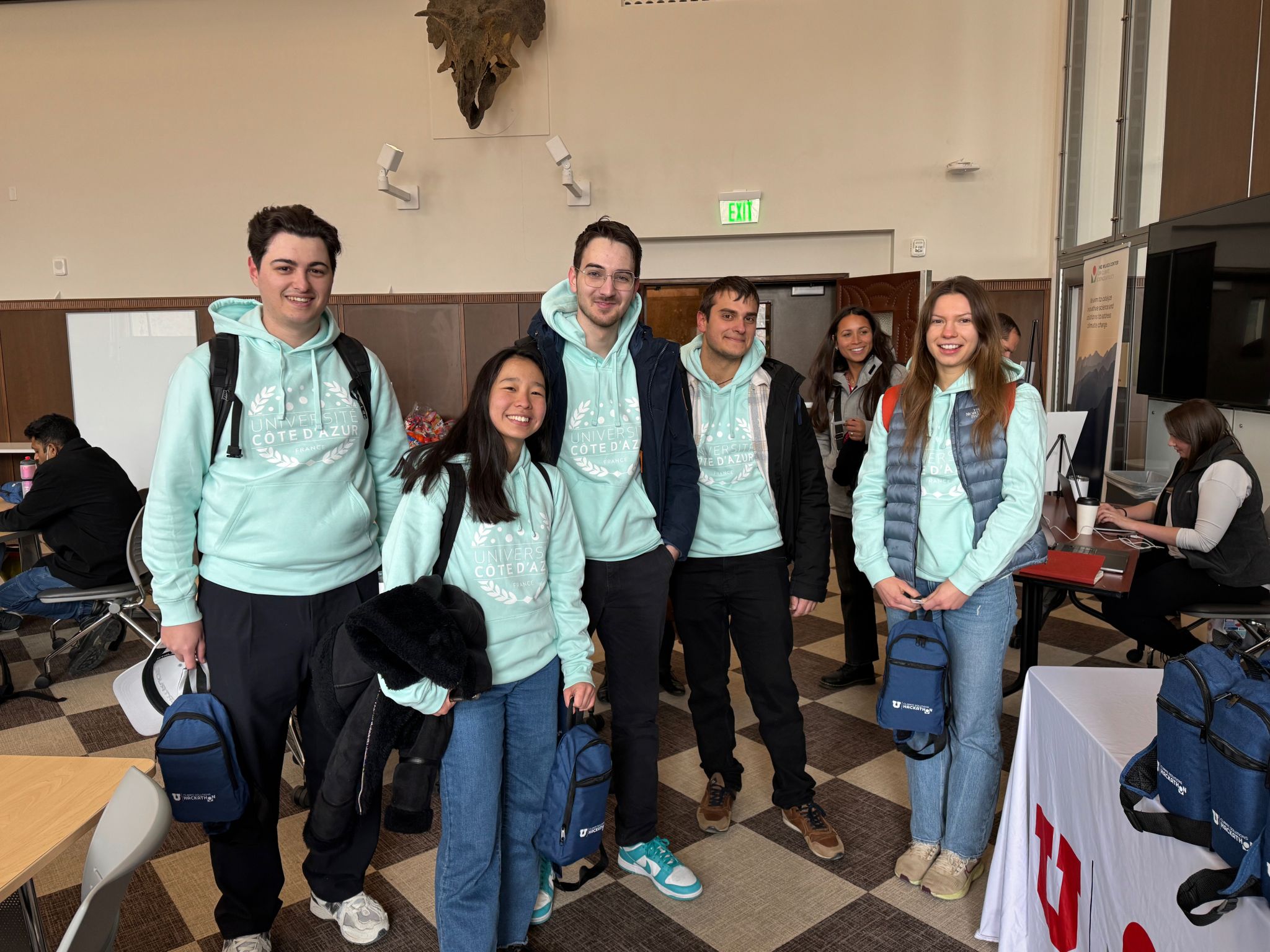
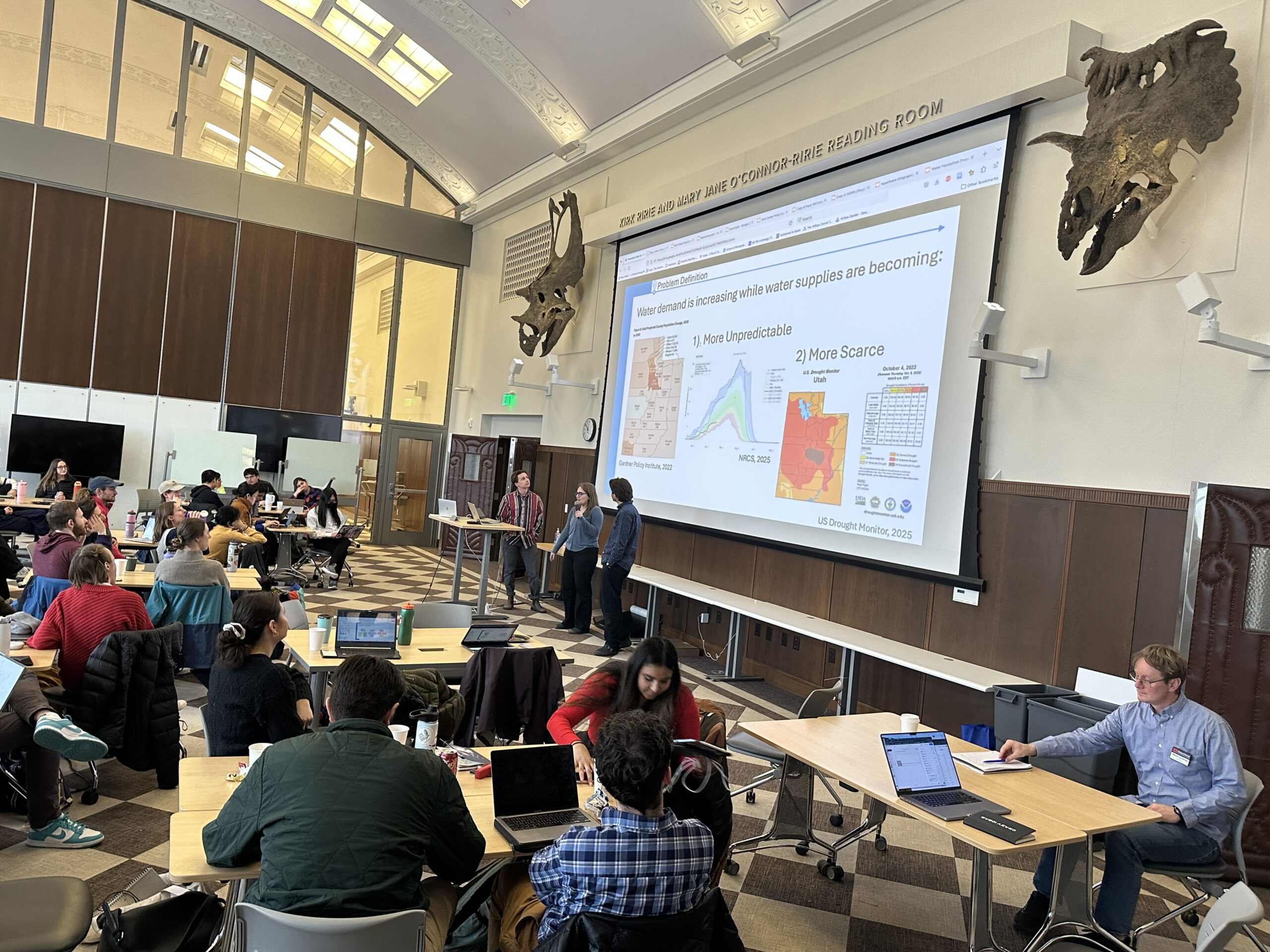
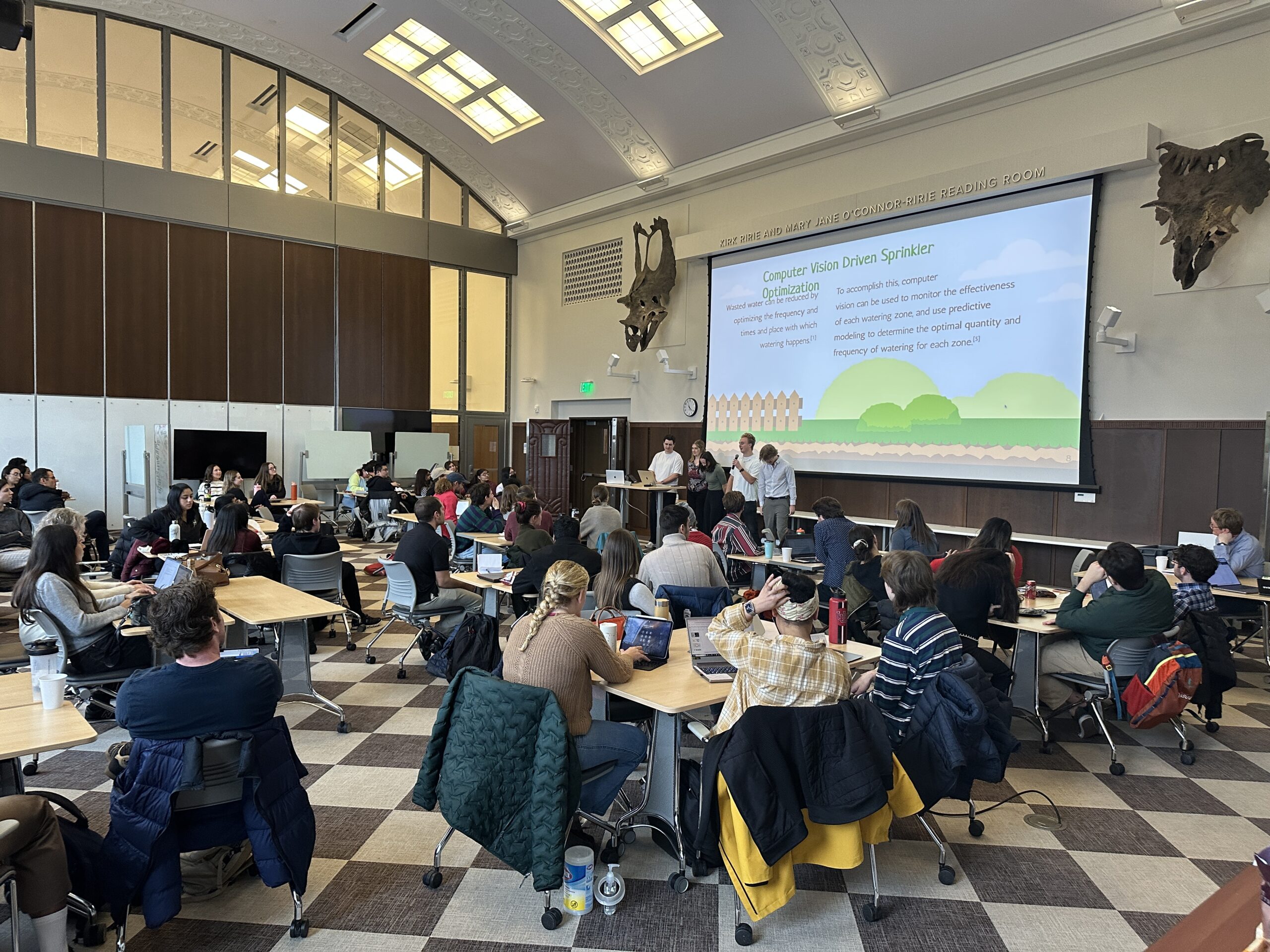
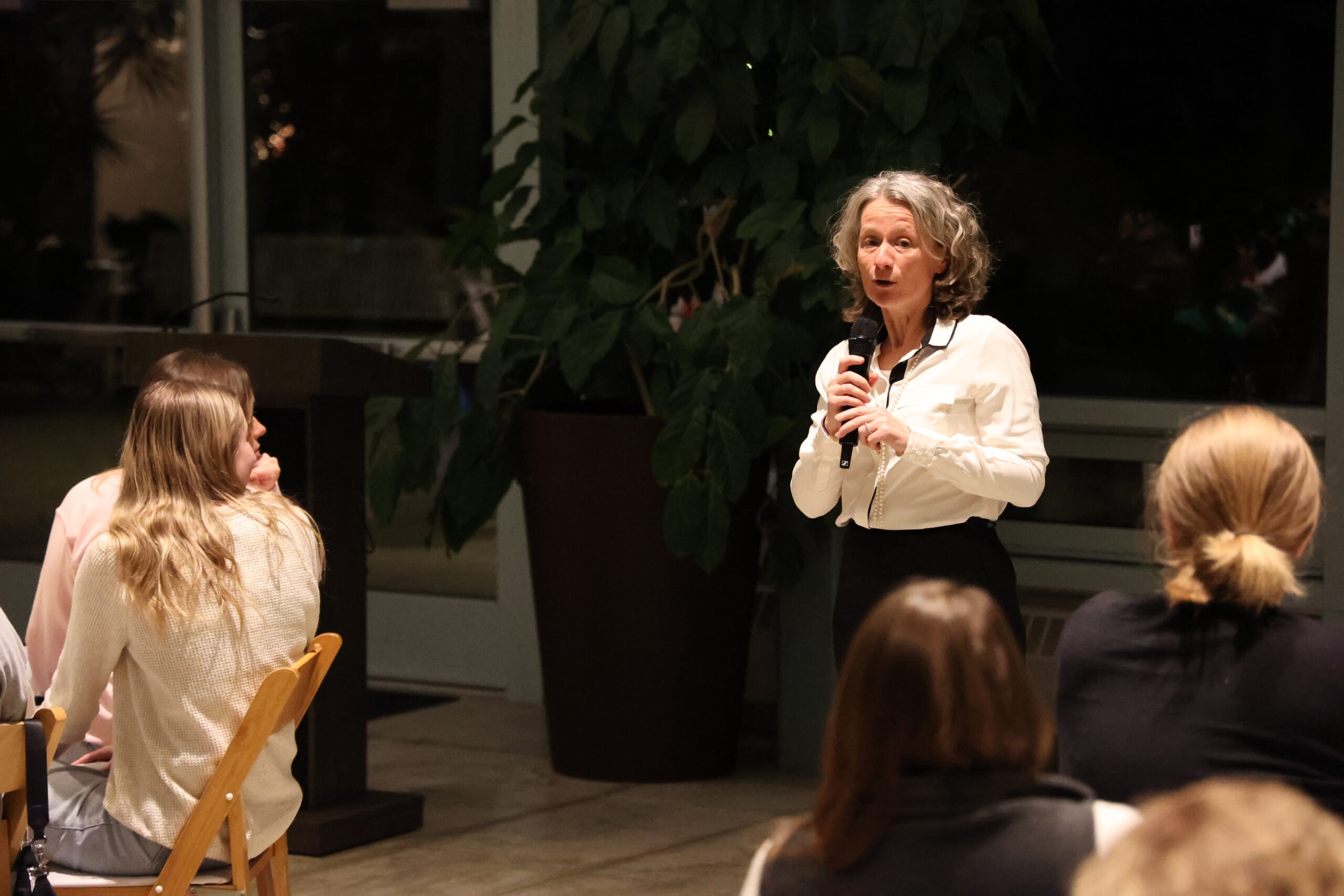
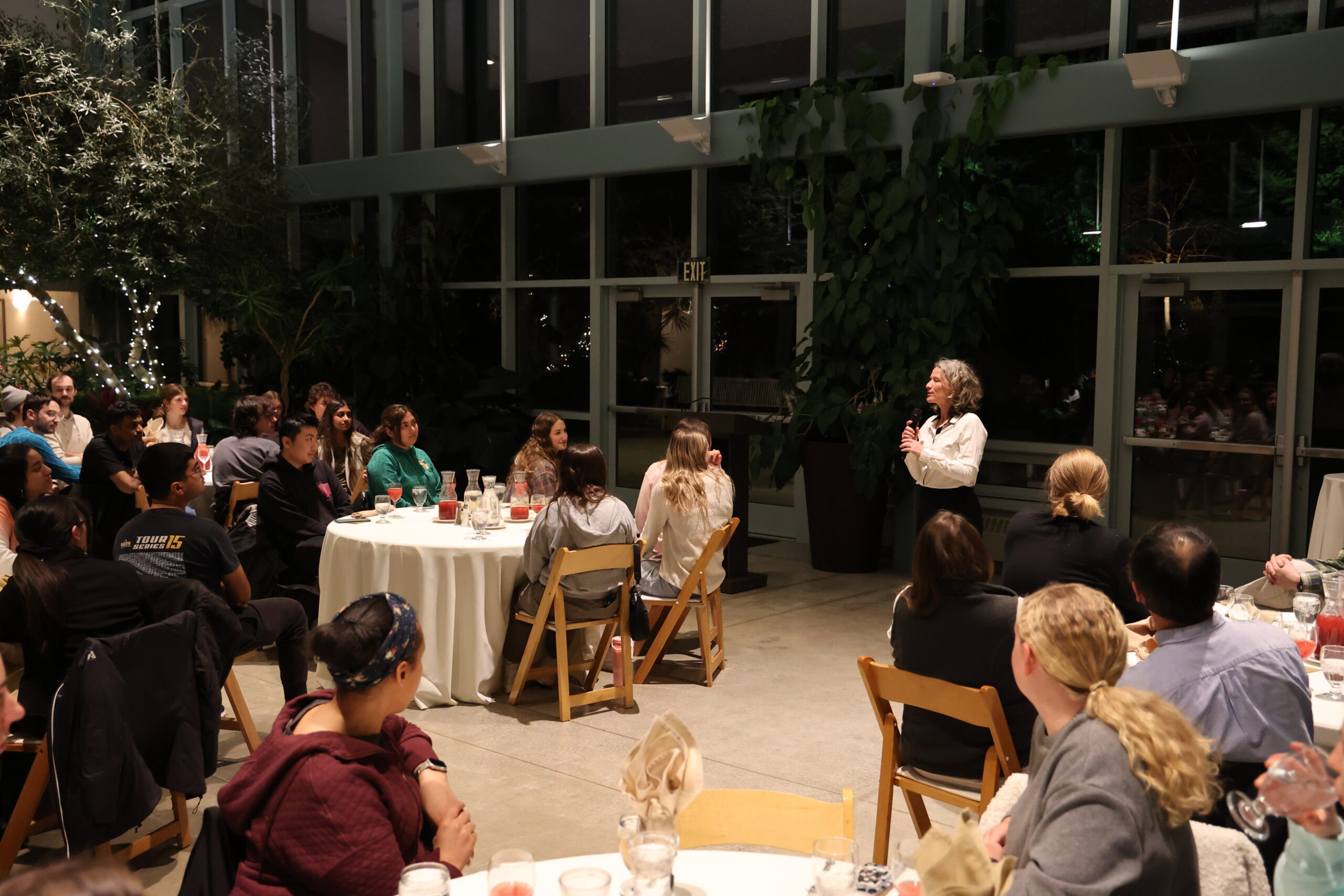
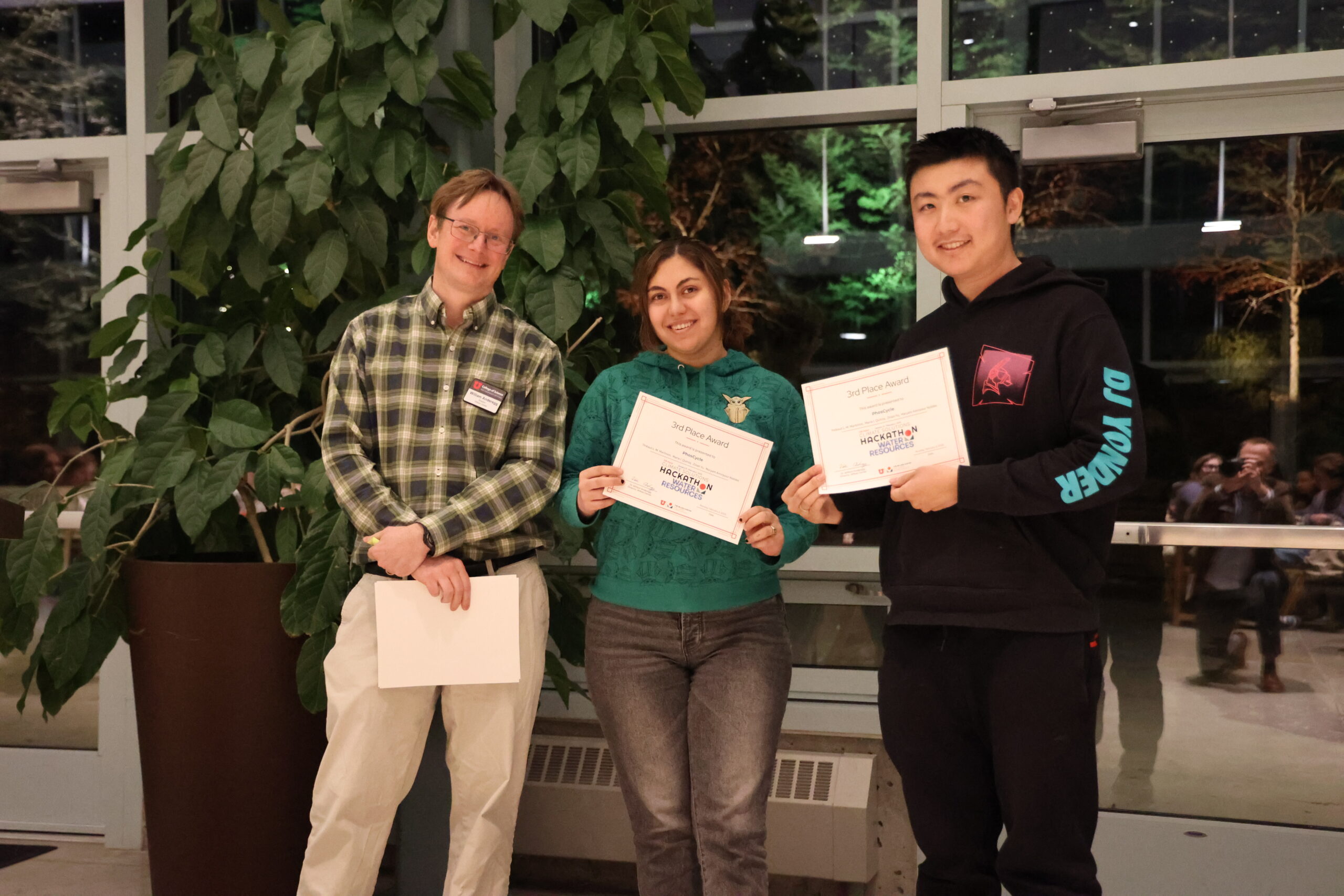
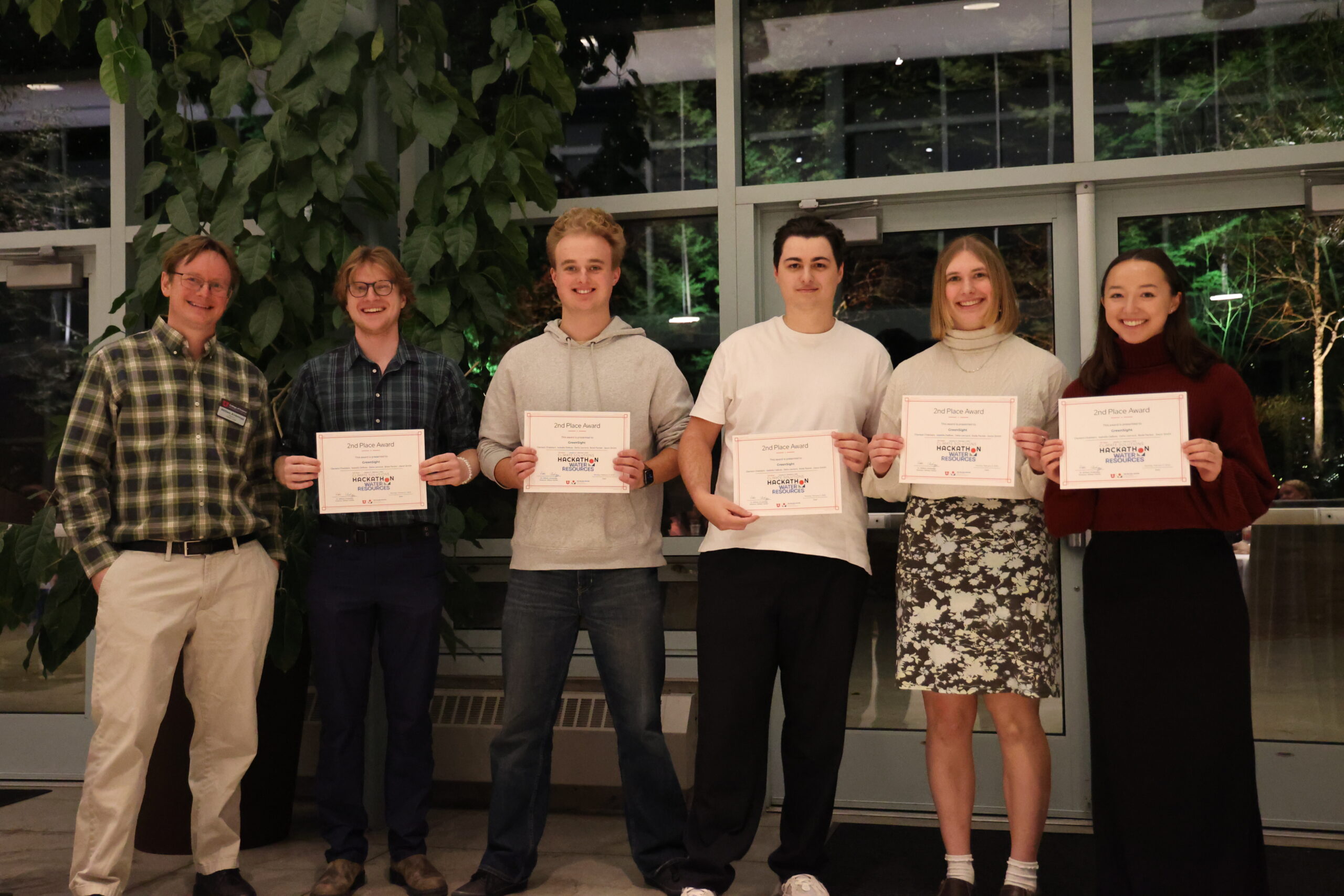
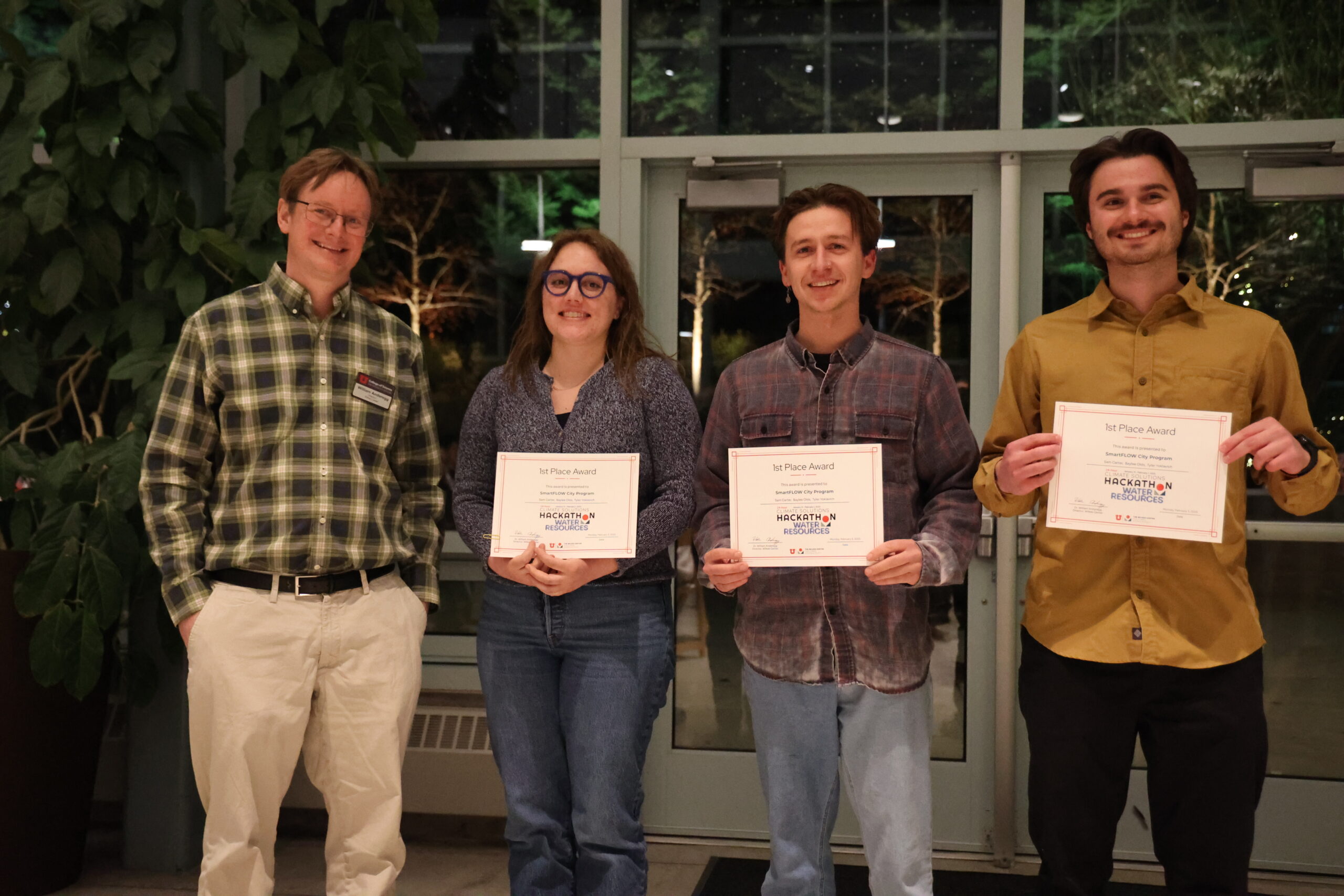
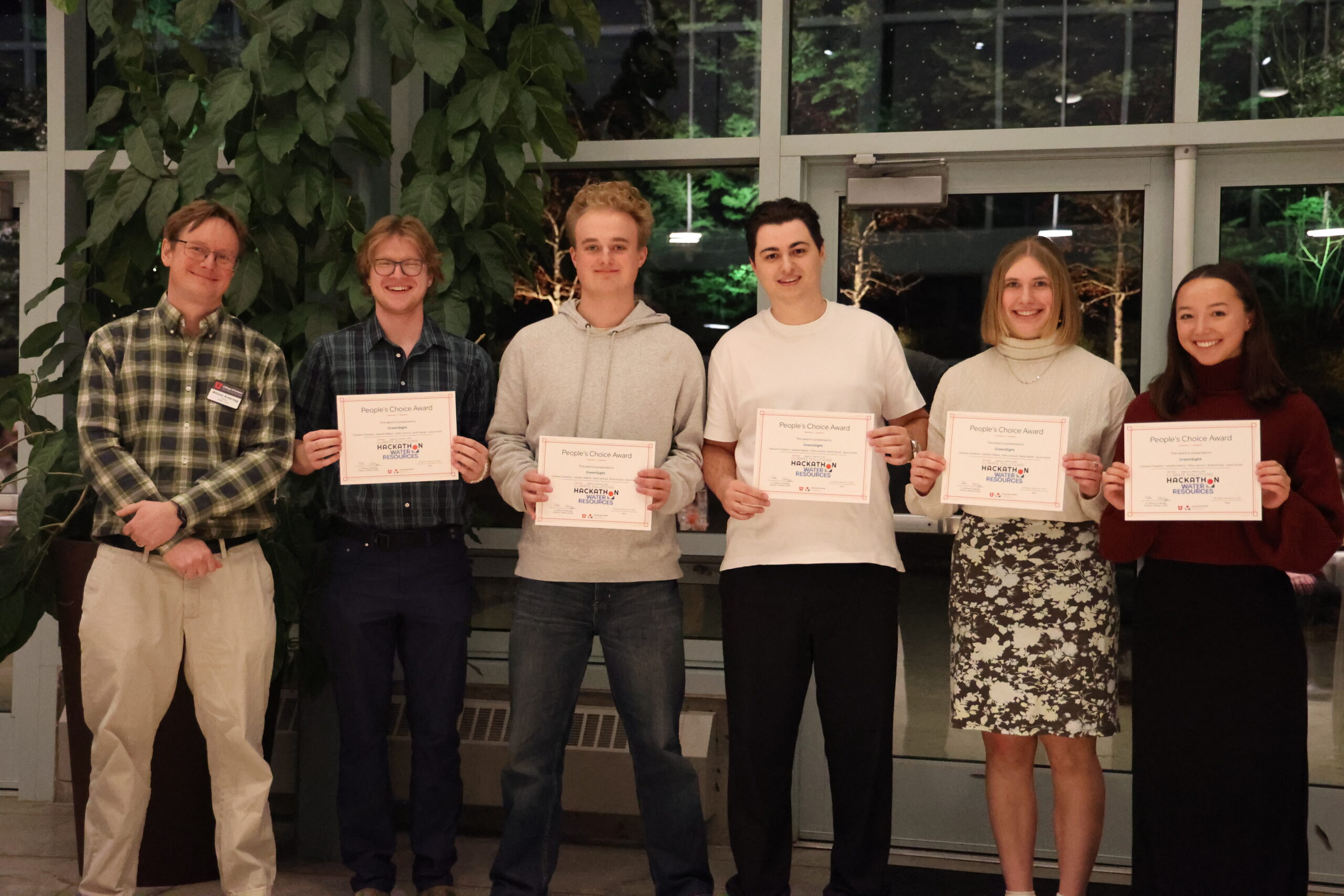
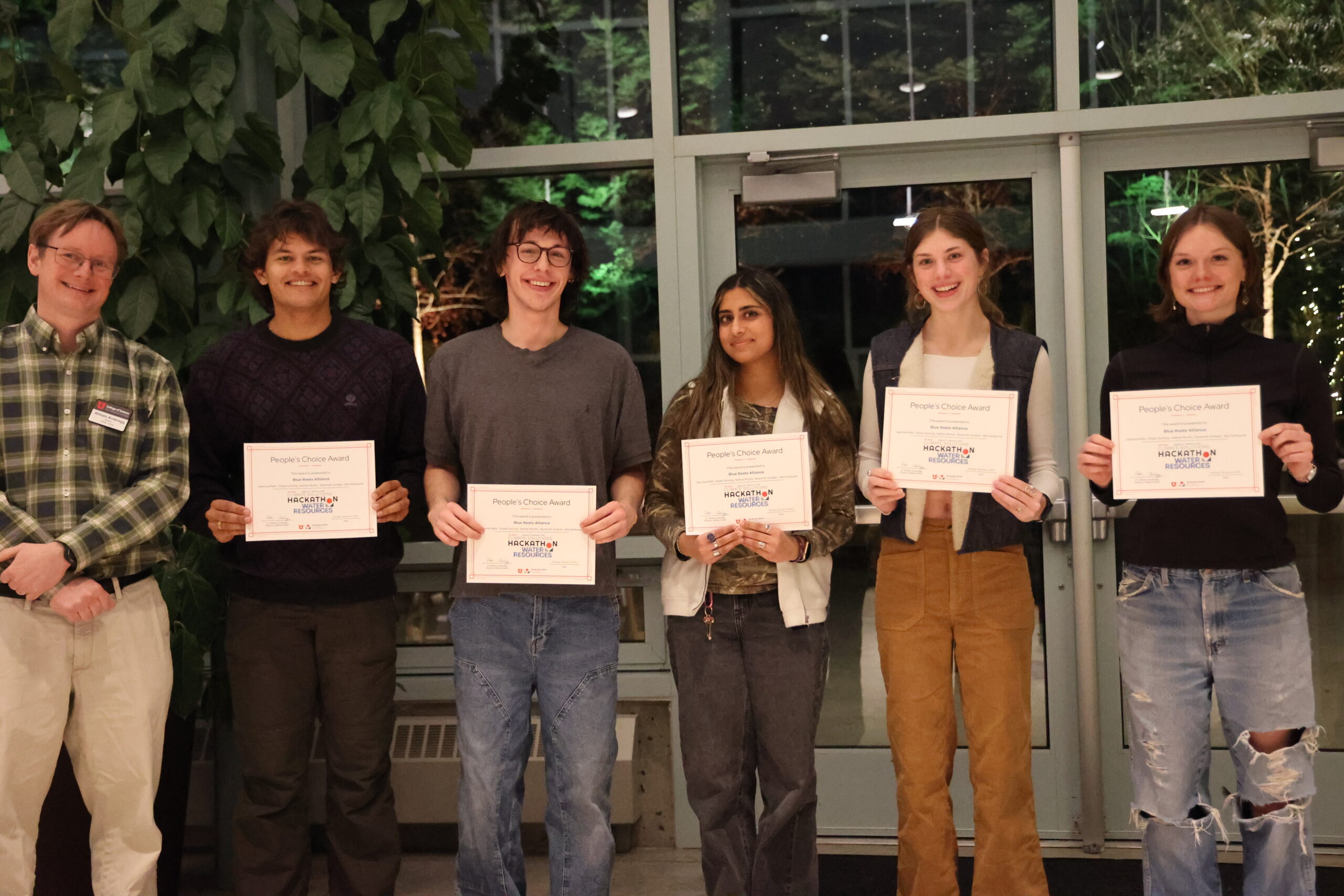
See Past Hackathons Events
The Focus: Water Resources

The 2025 climate solutions hackathon challenged undergraduate and graduate students from any discipline to team-up and develop proposals in a slide deck within 24 hours. Teams worked from Friday Jan. 31st until Saturday morning, Feb 1st. The teams of three to five had a day to propose a solution via a slide deck and short presentation promptly due the next morning. The challenge was to propose an innovative, data-driven solution in one of five categories:
- Municipal Water Supply
- Inland and Coastal Flooding
- Agriculture
- Drought
- Water and Energy Infrastructure
The Challenge Prompt
The 2025 hackathon focused on addressing the multi-faceted, highly critical and challenging topic of Water Resources. Here you will find a description of what students needed to accomplish in 24 hours. We identified five focus areas, described below, that are particularly important and have potential for innovative data-driven solutions. Teams could define projects in any of these areas, or at the intersection of one or more areas.
Media
@TheU: U, Cote-d’Azur students tackle climate-water solutions
(February 12, 2025)
See the winning teams
Here are the winning team submissions. You can see ALL of the submissions in the separate dropdown.
“GreenSight”
Clement Chatelain (Université Côte d'Azur), Isabella DeBoer (Computer Science HCS), Delia Leonard (Computer Science HCS), Bode Packer (Computer Science BCS),
Jaxon Smith (Computer Science BCS)
2nd People’s Choice Award
“Blue Roots Alliance”
Jasmine Malhi (Criminology HBA/Political Science HBA), Chase Canning (Data Science BS), Nathan Murthy (Earth & Environmental Sci BEN), Savannah Jordaan (Environmental & Sustain St HBS/Intmd Business BS), Alta Fairbourne (Sociology HBS)
Hackathon Video Mentoring Space
The Wilkes Center's 24-hour climate solutions hackathon challenged students from the University of Utah and Université Côte d'Azur, France, to come together to brainstorm creative solutions for water resources in the face of climate change. Research professionals from both universities share short bits of expertise and guidance for finding specific water resource solutions.
Water Research Resources
- Global Commission on the Economics of Water: “Valuing the Hydrological Cycle as a Global Common Good”
- Salt Lake City Public Utilities - Water Quality
- University of Utah - Vice President for Research's Office - Peak Water
- American Water Works Association
- American Water Works Association - Intermountain Section
- American Water Resources Association
- Utah DEQ - Division of Drinking Water
- Salt Lake County - Department of Drinking Water
- Salt Lake County Stormwater Coalition
- Salt Lake Public Utilities - Watershed
- Utah Association of of Conservation Districts
- Utah Department of Agriculture
The Focus: Wildfire

On January 26 and 27, 2024, the Wilkes Center for Climate Science & Policy held its second annual Climate Solutions Hackathon, with wildland fire as this year’s theme. The challenge posed to U students of any major was to propose an innovative, data-driven solution in one of five categories: 1) prediction and forecasting; 2) risk mitigation; 3) alert systems and evacuations, 4) community resiliency and rehabilitation, or 5) health hazards.
The hackathon organizers encouraged undergraduate and graduate students to form teams and submit a proposal in a slide deck within 24 hours. During the in-person portion of the event, U faculty from various departments along with local representatives from the US Forest Service engaged the different student teams with feedback and guidance.
The Challenge Prompt
The 2024 hackathon was focused on addressing the multi-faceted, highly critical and challenging topic of wildland fires. Below you will find the description of the challenge presented to hackathon participants to accomplish over 24 hours. The five focus areas listed are particularly important and have potential for innovative data-driven solutions. Teams could define projects in any of these areas, or at the intersection of one or more areas. READ THE PROMPT HERE.
Media
@TheU: Students win thousands at U’s Wildfire Hackathon
(March 6, 2024)
See the top 3 winning teams
Here are the top 3 winning team submissions. You can see ALL of the submissions in the separate dropdown.
1st Place:
Wildfire Resilience Collective
(Rebecca Senft, Hannah Meier, Tegan Lengyel, Elizabeth Williams)
3rd Place:
Fire Smart Educational Program
(Gaby Karakcheyeva, Celine Cardena, Brandon Saavedra, Xuan Hoang, Shreesh Srivastava)
Hackathon Video Mentoring Space
U research faculty and local US Forest Service professionals share expertise and guidance on wildfire solutions.
Wildfire Research Resources
NOAA HRRR-Smoke Forecasting Map
National Weather Service - Fire Weather
How Stuff Works - How Wildfires Work
National Park Service - Wildland Fire: What is Hazard Fuel Reduction?
Mental Floss - 10 Strategies Firefighters Use to Fight Wildfires
U.S. Forest Service - Wildfire Crisis Strategy - landscape factsheet
U.S. Forest Service - Understanding Forest Ecology: Fire, Water, and Bark Beetles (video)
U.S. Forest Service - Managing the Land
U.S. Forest Service - Science & Technology: Fire Forecasting
U.S. Forest Service - Managing Fire - After the Fire
Utah State University - Western Aspen Alliance - Promoting Sustainable Aspen Ecosystems
The Focus: Urban Heat

Cities are already warmer than surrounding areas, and climate change is increasing not only average urban temperatures but also the frequency and intensity of heat waves and formation of ozone. Individuals living and working within urban areas can suffer from heat stress and other heat related illnesses and will face increased respiratory symptoms and disease. Buildings within heat islands require more air conditioning and thus use more energy, increasing emissions of greenhouse gases as well as conventional pollutants.
Communities can respond to immediate health problems through emergency response plans and outreach to vulnerable neighborhoods, opening cooling centers, and providing other services. However, long-term changes in the natural and built environments are needed to keep residents, buildings, and communities cool and save energy and healthcare costs. States and local governments face challenges, however, in determining what to do given tight budgets, the complexity of options, the need to coordinate across agencies and jurisdictions, and more.
Read more about the 2023 Hackathon Challenge
@TheU: "Climate Hackathon yields ideas for managing urban heat"
The Winning 2023 Submissions
# 1 Submission: Green Campus Solutions

# 2 Submission: USmart Solutions
# 3 Submission: Hacking Urban Heat
Urban Heat Research Resources:
- Solutions to urban heat differ between tropical and drier climes, Princeton
- Urban Heat Master Class
- Mapping urban heat islands by air temperature
- As Rising Heat Bakes U.S. Cities, The Poor Often Feel It Most
- Heat and Health in American Cities
- Using Green Roofs to Reduce Heat Islands
- Using Cool Roofs to Reduce Heat Islands
- Berkeley Labs Roof Albedo Map
- The cruel irony of air conditioning
See All the 2025 Water Resources Hackathon Submissions
Agriflow (Celine Cardena, Gaby Karakcheyeva, Jacob Bastian, Brandon Peterson, Nehal Bakshi)
Aqua Volt (Olivia Stoffel, Kate Lauderback, Stephanie Horvath)
Aqua Aware (Dhruv Rachakonda, Tushita Sinha, Sakura Stankey, Caleb Standfield)
Blue Roots Alliance (Jasmine Malhi, Chase Canning, Nathan Murthy, Savannah Jordaan, Alta Fairbourne)
Cerulean Hydro Consulting (Adrian Sucahyo, Marli Bain, Vivek Anandh, Aarushi Verma)
Repipeousing (Maxwell Archibald, Natalia Cyriac, Ellis Chalker)
PhosCycle (Thibaut L. M. Martinon, Maria I. Quiros, Zinan Yu, Maryam Nobles)
Policy Lever (Adrian Martino, Alyssa Higham, Emily Snow, and Kyle Gardner)
Earth Flow (Henry Zheng, Navi Brar, Suhaani Shelat, Sarah Choe)
SWAB (Neena D’Souza, Callie Butler, Sarah Ung, Lexi Bohman)
Green Sight (Clement Chatelain, Isabella DeBoer, Delia Leonard, Bode Packer, Jaxon Smith)
Hacking the Grid (Adam Cossey, Maxime Gilquin, Siva Raghavendhar Boddu, Emily Golitzin, Kaitlin Meyer)
Hydro Ethos Solutions (Faith M. Bowman, Christopher Johanson, Juliette Dubois, Kathryn Lawrence, Michael Komigi)
SmartFLOW City Program (Sam Carter, Baylee Olds, Tyler Yoklavich)
Drought Resilience Network (DRNET) (Bibek Acharya, Madhu Mausam Thapa)
Energy-Water Solutions (Mahsa Omri, Ali Tasavvori, Maryam Baghkarvasef, Jean Serafino)
See All the 2024 Wildfire Hackathon Submissions
Survivor of the Land (Tarique Aziz)
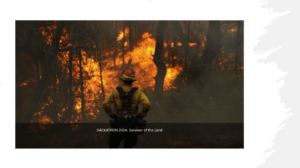
Campus Fire Watch (Sreya BISWAS, Sneha BISWAS)
FIRE edu (Eisenberg Mineau Scott)
(Prudencio, Bhandari, Gaire, Breach)
Wildfire Wisdom (Yeonjae Kim, Junha Kim, Wooyoung Kim, Tatum Lee, Jeongwoo Ryu)
Eco-Urban Ventures (Adrian Sucahyo, Michael Komigi, Vivek Anandh)
Wildfire Risk Mitigation (Delta Hong, Brad Lu)
Wildfire Awareness Response Network (Abbie Nistler, Brekke Pattison, Marcus Tanner)
Tame The Flame (Jack Perry, Thomas Stewart, Nathanael Busath, David Perry)
Ignite (Brandon Peterson, Nehal Bakshi, Jacob Sussman, Andrew Erickson)
Fire Beavers (Shreja Kapoor, Archit Dudeja, Sujan Shahi)
Small Community Reconnaissance, Early Alert, and Evacuation Guidance System (Bibek Acharya, Zain Syed)
War on Fire (Teigan Edmunson, Anton Towers)
Real time mapping of safest path during wildfire (Mohammed Ayman Habib, Sai Eshwar Tadepalli, Anusha Vivekanand)
Frequently Asked Questions
A hackathon is an event where people come together to find creative solutions to a specific problem or challenge. In this case, the hackathon is focused on finding solutions to the various aspects of water resources. This hackathon will bring together participants from a variety of fields, to work together to come up with innovative solutions to this complex and pressing problem. The event will be fast-paced, with participants working in teams to quickly develop and present their ideas.
Any University of Utah student over the age of 18 can participate! All majors and departments are welcome.
No coding experience required!
Unlike most hackathons, our event is open to students of all skill levels and backgrounds from artists to engineers, and while friendly competition will be present, growing in skill should be the primary aim for all of our attendees.
You may register as an individual or as a team. Teams must consist of 3-5 students. It is recommended you form your team in advance. Invite your friends or connect with other participants over the coming Slack channel to form a team together!
No. The Climate Solutions Hackathon is a hybrid event, so you can join us in the Crocker Science Center or take part in the comfort of your home.
Participation is free of charge and we provide all the food and beverages you need for our in-person attendees.
That's ok!!! All instruction materials and resources will be made available online when the event starts. Feel free to start hacking at the start time and take a break to attend class!
- Problem Definition and Analysis: For this criterion, we only focus on the problem challenged, not on the solution created to solve this problem. How precise and relevant is the defined problem? How interesting or difficult to resolve - functionally or technically - is the problem being challenged?
- Uniqueness & Innovation: Does the application approach a new problem, or look at an old problem in a new way? Is the solution completely innovative or does it rely on an existing concept/technology? Does the application impact a large number of people very broadly, or impact a smaller number of people very deeply? To what degree does the application actually solve the current problem?
- Idea Feasibility: Is the application technically and marketplace viable? Would people use this product? Is this solution only theoretical or does it have a realistic application for commercial purposes? (Not necessarily here and now, but eventually in the future and/or for certain markets).
- Implementation & Scalability: Does the product function, or is the product immediately actionable? is the path of implementation clearly discussed at different scales (end user, space in/effect on the market, regulations required or avoided)? what is the potential for long term impact of the team’s project?
